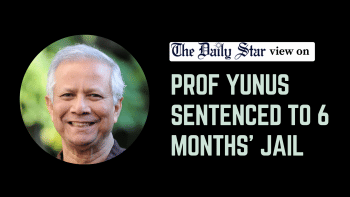Dr Yunus’ conviction sets a repugnant precedent

Bangladesh has once again set a new record by convicting a Nobel laureate for alleged violations of the country's law. The only other Nobel laureate punished after winning the prize is Myanmar's dethroned leader Aung San Suu Kyi, whose conviction was purely political and the consequence of a military takeover. There is a host of Nobel laureates who won this prestigious accolade while they were in prison. But imprisoning a Nobel laureate is an occurrence rarer than rare. Rather, in a recent incident, we saw the exoneration of the Philippines' celebrated journalist Maria Ressa in a tax avoidance case after she won the award.
In Bangladesh's case, it is ironic that the apprehension expressed by 176 world leaders and Nobel laureates that Prof Muhammad Yunus has been targeted with "continuous judicial harassment" has become a reality over a period of four months. The conviction of 83-year-old Dr Yunus and three of his colleagues, in many ways, sets a new example. The frequent vilification of Dr Yunus by Prime Minister Sheikh Hasina and a number of senior Awami League members, as well as the sustained media trial by pro-government news channels and newspapers, have led many people to believe the whole process was an orchestrated persecution. The Nobel laureate has been called blood-sucker, tax evader, anti-state individual, and someone who deserves to be thrown into Padma River—as if the rest of the world was mistaken in respecting him as a novel thinker and social reformer.
Professor Yunus and three other executives of Grameen Telecom were convicted and each sentenced to six months in prison and a financial penalty of Tk 30,000 for labour law violations. These sentences remain pending, allowing them to appeal within a month. After the conviction was delivered, Yunus told the media that he was punished for a crime which he didn't commit. His lawyers said they did not get justice and the case was "meritless, false, and ill-motivated."
Md Shahjahan Saju, a former judge who presided over trials of hundreds of cases on the first labour court in Dhaka for nearly three years, told me that prosecutions by the Department of Inspection for Factories and Establishments (DIFE) were so rare that their share would be less than five percent. It is the agency entrusted with overseeing working conditions and law abidance by employers. But it is no wonder that legal practitioners are unable to cite any example of a similar prosecution to Dr Yunus' for identical offences allegedly committed by others. The former judge also said that he could not remember a single verdict that had awarded a jail term in cases similar to Prof Yunus'.
Dr Yunus' ordeal all began with the government's refusal to make any exception in banking rules and with removing him unceremoniously from Grameen Bank. Curiously enough, the government amended the banking rules a decade later anyway to keep the central bank governor at his job for two more years. Then came the allegations of workers exploitation. Now, Dr Yunus faces over 100 cases arising from a single issue of alleged labour law violation, which was already settled once between the employees' union and the company management. Attempts were also made to implicate him in money laundering and corruption cases. All these actions establish a pattern which is so disturbing that no one can be blamed for concluding it as a "judicial harassment."
This is easy to verify by ourselves, too. Has anyone ever heard of any garment factory owner being prosecuted for violations of the same labour law? Such violations have been going on for decades, despite buyers' concerns and despite demands raised by several rights groups to the point of them threatening to cancel their orders. How many workers in the ready-made garment industry have permanent jobs? How many of them get their due share of profits when they are sacked?
According to Bangladesh Occupational Safety, Health and Environment (OSHE) Foundation, as many as 1,432 workers were killed and 502 were injured in their workplaces across the country in 2023. Could some of these accidental deaths have been prevented if the DIFE had been sincere in implementing its inspection regime and in prosecuting offending employers?
There is no doubt that Grameen Telecom has all the necessary authorisation of the government under the law as a non-profit company, and that the Companies Act, 1994 bars it from the distribution of any profit it makes. Due to lack of harmonisation among various existing legislations, some conflicts between different pieces of laws do exist. In this case, theoretically, it was possible that distribution of any profit could have resulted in another prosecution for a violation of the Companies Act, 1994. Therefore, before prosecuting Dr Yunus, the government should have amended either of these two laws and allowed companies to take corrective measures. So, when abiding by one rule means violating another, how can such prosecution render justice? It only strengthens the argument that the government would have punished the Nobel laureate one way or the other, using whatever tool it could.
Much of Western media have wrongly portrayed Dr Yunus as a vocal critic of Prime Minister Sheikh Hasina, though he has not made any political statements since abandoning his bid to launch a political alternative to the existing dominance of two parties, Awami League and BNP. He also refrained from criticising any government policies over the last 15 years. These facts put into question why the ruling party is so hostile towards Dr Yunus. After taming the opposition by imprisoning BNP chief Khaleda Zia, this conviction of a global icon (who has brought about innovative social reforms) is meant to send a chilling message to others: activism doesn't have to be anti-government to be punished; it can even be something that the ruling party simply doesn't approve of.
Dr Yunus' ordeal all began with the government's refusal to make any exception in banking rules and with removing him unceremoniously from Grameen Bank. Curiously enough, the government amended the banking rules a decade later anyway to keep the central bank governor at his job for two more years. Then came the allegations of workers exploitation. Now, Dr Yunus faces over 100 cases arising from a single issue of alleged labour law violation, which was already settled once between the employees' union and the company management. Attempts were also made to implicate him in money laundering and corruption cases. All these actions establish a pattern which is so disturbing that no one can be blamed for concluding it as a "judicial harassment." These actions against Bangladesh's only Nobel laureate should end, and end now.
Kamal Ahmed is an independent journalist. His X handle is @ahmedka1
Views expressed in this article are the author's own.
Follow The Daily Star Opinion on Facebook for the latest opinions, commentaries and analyses by experts and professionals. To contribute your article or letter to The Daily Star Opinion, see our guidelines for submission.

 For all latest news, follow The Daily Star's Google News channel.
For all latest news, follow The Daily Star's Google News channel. 









Comments